PART 1 - The state of play on the rights of older persons in need of care and support at international level
AGE Platform Europe developed an ‘Older persons’ self-advocacy handbook’ which intends to increase and improve the involvement of older persons in all processes that affect their human rights.
In this handbook, more detailed information can be found on how the United Nations, the Council of Europe and the European Union address the rights of older persons. Readers can understand better how to implement these policy guidelines and participate in the relevant policy making processes. To access AGE Handbook, click here.
In theory, older persons in need of care and support have the same rights as everyone else.
In reality however, they face everyday concrete obstacles specific to their age and their living conditions.
Older people face concrete (structural) barriers enshrined in law or policy, or ageist attitudes by society as a whole, media, and including by some professionals and families.
These result in age discrimination and lack of access to essential goods and services, lack of access to trained and competent professionals and lower quality of service provision, decreased access to healthcare or opportunities for social participation, absence of financial support for long-term care, neglect and abuse.
A number of processes in the United Nations, at the Council of Europe and the European Union have set to address these issues.

1.1 The United Nations’ framework
The United Nations (UN) has established several instruments and processes that relate to the rights of older persons in need of care and are further described below:
The UN Principles for Older Persons
The United Nations Principles for Older Persons were adopted in 1991. Although they are not binding, governments are encouraged to take them into account when they develop laws and policies that target this group. The 18 principles are an important benchmark for all stakeholders who deal with older people.
These principles address 5 key areas of older people’s lives:
- Independence
- Participation
- Care
- Self-fulfilment, and
- Dignity
You may find the UN Principles for Older Persons here.
The Madrid International Action Plan on Ageing (MIPAA)
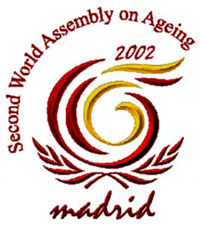
Adopted in 2002, the Madrid International Plan of Action on Ageing “aimed to mark a turning point in how the world addresses the key challenge of building a society for all ages”.
It represents the consensus of the international community to take action on three priority areas: older persons and development; advancing health and well-being into old age; and ensuring enabling and supportive environments.
The action plan is an important resource for policymakers, practitioners but also for non-governmental organizations and older citizens. It establishes a comprehensive agenda that governments should implement through dedicated action.
To monitor how far they deliver their political commitments and to suggest further action, governments need to report on their achievements every 5 years. The next review of the implementation of the MIPAA will be concluded in 2017.
The MIPAA includes a full range of relevant articles on the rights of older persons in need of care, covering caring responsibilities in employment, support for independent living in rural areas, intergenerational support, and address poverty among the oldest old.
In particular, the most relevant are:
-
Priority direction II: Advancing health and well-being into old age
- Issue 2: Universal and equal access to health care services, promotion of a ‘continuum of care’ (health care, long-term care, palliative care, social services), and of prevention and rehabilitation, strengthen access to primary healthcare, tackle ‘age discrimination and age-related disability discrimination in the provision of services’ and include older persons in the development and improvement of primary and long-term care services
- Issue 4: Training of care providers and health professionals, including informal carers, and support an integrated approach in care, with gerontologic and geriatric skills
- Issue 6: Maintain the maximum functional capacity throughout the life course and promote the full participation of older persons with disabilities
-
Priority direction III: Ensuring enabling and supportive environments
- Issue 1: Housing and the living environment with a specific emphasis on the promotion of ‘ageing in place’ in the community and support independent living, multigenerational co-residence and use of technologies
- Issue 2: Care and support for caregivers, in particular through adequate public policies and social support systems, adequate assistance from formal care services and informal carers through a ‘continuum of care and services’, with an emphasis on ‘older women’
- Issue 3: Eliminate all forms of neglect, abuse and violence of older persons and create support services for victims of abuse, and train professionals. Consumer fraud is also covered
To support the implementation of the MIPAA, European States have adopted a Regional Implementation Strategy, which provides a list of envisaged relevant ageing policy development in the region.
This regional strategy includes the commitment to ensure quality of life at all ages and maintain independent living, including health and well-being (Commitment 7).
Both the MIPAA and its Regional Implementation Strategy are important reference documents not only for policymakers but also for practitioners in the field of long-term care, as they set out policy objectives but also indications on how to achieve the desired outcomes.
For more information:
- Full European Regional Implementation Strategy.
- AGE’s contribution to the 2016 review of the MIPAA.
- The MIPAA: Full text in English and in other languages.
- More information on the MIPAA in AGE’s handbook on older persons’ human rights.
The United Nations Convention for the rights of persons with disabilities (UNCRPD)
The United Nations Convention for the rights of persons with disabilities (UNCRPD) is the latest international human rights treaty and the first one to be ratified by the European Union. This means that all EU member states which ratified it as well as the EU need to make sure that their policies are in compliance with the standards set by the Convention.
The UNCRPD is relevant for older persons in need of care as it defines persons with disabilities as follows:
‘Persons with disabilities include those who have long-term physical, mental, intellectual or sensory impairments which in interaction with various barriers may hinder their full and effective participation in society on an equal basis with others.’
Whereas the UNCRPD does not address the full range of challenges faced by older persons in need of care, and in particular those situations related to ageism and age discrimination, it covers many important aspects of older persons’ lives, including access to disability benefits, health services, support for independent living, fight against violence and abuse, accessibility and others.
For more information:
- Full text of the UNCRPD.
- How the UNCRPD and applies to older persons with functional limitations in AGE self advocacy handbook on the rights of older persons.
A committee of independent experts is responsible for monitoring how States and the EU implement the UNCRPD. This Committee can publish for example guidelines on how the right to independent living should be applied in practice, and contribute to the reflection on how the UNCRPD concretely applies to older persons in need of care.
The Committee already acknowledged that: "the international standards adopted in the Convention on the Rights of persons with disabilities (CRPD) entirely apply to older persons" (see full position here)
This means that age alone cannot be used to limit from the application of disability policy and legislation to older people in need of support. Governments that exclude older people with disabilities from accessing related benefits and services, such as disability allowances or personal assistance are actually violating the UNCRPD.
Stakeholders, including service providers should also look at how to adapt their practices to comply with the UNCRPD principles, since they are responsible to apply the Convention as it has been translated into national law.
AGE Platform Europe monitors the implementation of the UNCRPD so that older people in need of care and assistance enjoy the same standards of support as younger people with disabilities. For example, we submitted our views to the UNCRPD Committee and the UN Special Rapporteur on Disability highlighting the age-specific barriers faced by older persons, in particular the unequal availability of benefits for older people with functional limitations and/or support needs in comparison with younger persons with disabilities.
The Open-Ended Working group on Ageing (OEWGA)

In 2010, the United Nations General Assembly established the Open-Ended Working Group on Ageing (OEWGA), the first global process that has been set up to specifically examine what UN Member States can do so that older people can fully enjoy their human rights. The OEWGA aims to evaluate existing international instruments and to consider the need and feasibility of introducing new measures and legal tools, such as a new binding treaty. Over the years, the OEWGA has strengthened its dynamic by introducing a focus on thematic areas, and by discussing also normative elements – i.e. the elements that could constitute the rights in a legally binding instrument.
AGE Platform Europe has taken part in the OEWGA sessions since 2012, bringing the voice of older Europeans. Long-term care and elder abuse have been central themes of the OEWGA, especially in its 8th and 9th session, where these were the focus themes. These discussions are very relevant for policymakers as well as legal professionals, service providers and other stakeholders working in the field of ageing, because they shape a new rights-based vision for long-term care.
For more information on the OEWGA:
- OEWGA website
- Dedicated part in AGE’s handbook on the rights of older persons.
- The reports of the 8th (2017) and of the 9th (2018) sessions, which focused on elder abuse and long-term and palliative care.
The Independent Expert on the rights of older persons
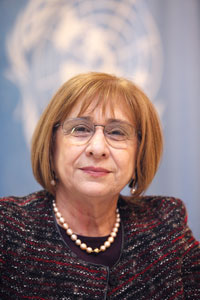
In May 2014 Ms. Rosa Kornfeld-Matte from Chile was nominated as the first Independent Expert on the Enjoyment of all Human Rights by Older Persons.
The expert has in her mandate to monitor, evaluate and report on the state of older people’s rights on a worldwide level, identifying both good practices and protection gaps.
In her report on care and autonomy, Ms. Kornfeld-Matte highlighted the risk of human rights violations in the context of care provision to older people. She emphasized that the responsibility for levying barriers to autonomy lies with the state and clarified governments’ obligations, which include affording adequate resources and promoting a rights-based culture of care.
In her report she also focuses on the wide range of issues related to legal capacity, the development of adequate social protection and standard of living as well as the rights to work, housing, accessibility, participation, social inclusion and health.
She also covers particular aspects of care institutions, including the need for quality control and assessment to prevent and fight elder abuse, as well as access to palliative care. Finally she makes some recommendations to Member States, including the development of comprehensive national ageing strategies and the establishment of national councils on ageing.
Overall, the Expert provides in her report specific guidelines for the exercise of the right to care and autonomy and calls for ‘a paradigm shift that focuses on the inclusion of older persons in society at all levels, encompassing age-friendly communities and environments, as well as people-centred models of care, and that promotes the autonomy and dignity of older persons’.
Ms. Kornfeld-Matte was also invited by the Slovenian and Austrian governments to take part in country visits to evaluate the current state of protection of the human rights of older people.
Her speech on the 15th June 2015
More information:

1.2 Council of Europe’s framework
The Council of Europe (CoE) includes several instruments for the protection of older people’s rights.
- The European Convention of Human Rights is the main CoE human rights instrument and is monitored through the European Court of Human Rights based in Strasbourg, France.
While it does not explicitly refer to old age, older persons, or care the interpretation of the Convention by the European Court of Human Rights has paid significant attention to human rights in the context of eldercare. A factsheet summarizes the most relevant case law of the Court for older people, including those in need of care, here.
For example, the McDonald vs UK ruling showcased that the absence of an adequate care plan can amount to a breach of the rights to dignity and private life of the older person.
- The European Social Charter was adopted in 1961 and revised in 1996 to guarantee social and economic rights.
Article 23 of the revised charter –the first binding human rights provision for the protection of older people – enshrines the right of older persons to social protection including access to information about services and facilities available for older persons, provision of housing suited to their needs and their state of health or of adequate support for adapting their housing and access to health care and services.
The Committee on Social Rights oversees the implementation of this treaty and has for example ruled that the system of financial support for family and friend caregivers should not depend on their place of residence, as this would imply an unequal application of the European Social Charter. (Case of Central Association of Carers in Finland). Following this deliberation the Committee of Ministers of the CoE addressed a recommendation to Finland asking the review of its national legislation.
NGOs which think that national laws and policies are in violation with article 23 of the Charter, can submit related complaints to the committee once they have been granted the right to participate in this procedure.
-
The European Committee for the Prevention of Torture is an independent body of experts which has the mandate to visit institutions where persons are deprived of their liberty, including nursing homes and other social care facilities.
Based on their visits they draw recommendations to the government concerned on how to improve the quality of life of people in living in such institutions in the country
-
The Convention on preventing and combating violence against women and domestic violence (Istanbul Convention), provides a legal framework and a monitoring mechanism for the protection of women from all forms of violence.
Its scope includes abuse against older women. A number of European networks of NGOs, including AGE, has called the European Union to access this Convention.
- The Recommendation on the rights of older persons, which is the first regional instrument specifically protecting this group. It will be explained more in details below.
More information:
Focus on the Council of Europe’s recommendation on the rights of older persons
The Council of Europe adopted in 2014 a recommendation focusing specifically on the rights of older persons. Although non binding, this instrument is a useful advocacy tool for the rights of older persons in Europe.
The recommendation also foresees a review 5 year after its adoption, when States will submit reports assessing progress in its implementation.
It takes inspiration from several reference documents, including the European Charter for the rights of older persons in need of long-term care and assistance and its accompanying guide.
The recommendation covers the rights of older persons in need of care, and in particular includes a detailed chapter on ‘Care’ divided into four areas: general principles, consent to medical care, residential and institutional care and palliative care.
This recommendation highlights for the first time older people’s right to care. The recommendation stresses the need to prevent and address elder abuse and emphasizes the role of informal carers, as well as the responsibility of states to provide them with adequate support and training. It also addresses the areas of non-discrimination, autonomy and participation, and administration of justice. The recommendation also provides guidelines on ways to apply it in practice in its explanatory memorandum and a list of good practice examples.
“Older persons have the right to respect for their inherent dignity. They are entitled to lead their lives independently, in a self-determined and autonomous manner. This encompasses, inter alia, the taking of independent decisions with regard to all issues which concern them, including those regarding their property, income, finances, place of residence, health, medical treatment or care, as well as funeral arrangements. Any limitations should be proportionate to the specific situation, and provided with appropriate and effective safeguards to prevent abuse and discrimination.”
(Art. 9 of the recommendation)
Although Member states are not legally bound by this instrument, they have committed politically to do more to put the rights of older people in effect. The Recommendation complements existing binding human rights treaties.
As it provides specific policy guidance, it has a real potential for impact on the ground if governments take it into account in their policymaking.
This is why it is important to raise awareness about the existence of the instrument, and for policymakers and practitioners to use it as a reference document.
More information:
1.3 Role of the World Health Organisation and of the International Labour Organisation
The WHO and the ILO contributed to a wide extent to the debate on long-term care by providing both strong policy recommendations and relevant data enabling policy makers to adopt evidence-based measures enabling older persons to exercise their rights.
The World Health organization (WHO)
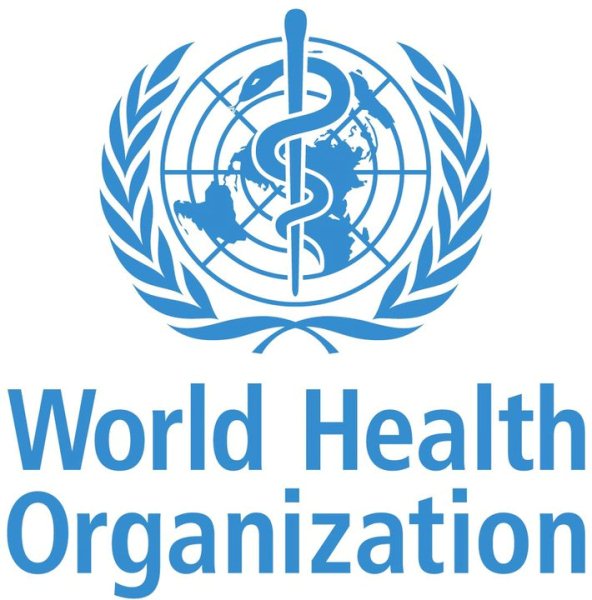
Within the UN, WHO is the directing and coordinating authority on international health, by leading international processes in the area, shaping the research agenda, setting norms and standards, provide technical support and building the capacity of the governments involved..
According to the WHO, “health” is a state of complete physical, mental and social well-being and not merely the absence of disease or infirmity.
The WHO’s activities in the field of ageing are numerous. Three main areas of interest on the rights of older persons in need of care are the following:
-
Age friendly cities framework

According to the WHO, “a key strategy to facilitate the inclusion of older persons is to make our world more age-friendly. An age-friendly world enables people of all ages to actively participate in community activities and treats everyone with respect, regardless of their age. It is a place that makes it easy for older people to stay connected to people that are important to them. And it helps people stay healthy and active even at the oldest ages and provides appropriate support to those who can no longer look after themselves”.
A label and a guide for "age-friendly cities" have been developed since 2007, and a dedicated website, called Towards an age-friendly world has been made available.
-
WHO Strategy and action plan for healthy ageing in Europe (2012-2020)
WHO is actively involved in designing the international policy framework in the field of healthy ageing, which impacts on many aspects of the lives of older persons in need of care.
The Strategy has a dedicated part on ‘People centred health and long-term care systems fit for ageing populations’, and includes specific interventions on informal care, prevention of elder maltreatment and ‘Quality of care strategies for older people including dementia care and palliative care for long-term care patients’. Look at the strategy for more information.
-
The WHO European region report on preventing elder maltreatment
This report is a unique reference document on elder abuse, analyzing existing data on elder abuse and providing overall analysis and policy recommendations for governments. The report is available here for download.
The International Labour Organization (ILO)
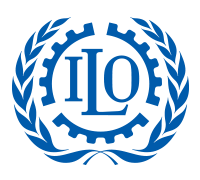
The ILO is a UN organization giving an equal voice to workers, employers and governments to ensure that the views of the social partners are closely reflected in labour standards and in shaping policies and programmes.
The main aims of the ILO are to promote rights at work, encourage decent employment opportunities, enhance social protection and strengthen dialogue on work-related issues.
It regularly publishes reports and recommendations for governments, including in the field of quality of work for care practitioners, and social protection.
It published in 2015 a study on long-term care protection for older persons which highlights the fact that more than half of the global population aged 65 and above, representing 300 million people, is excluded from urgently needed long-term care (LTC), partly due to a lack of 13.6 million LTC workers worldwide. The report states that LTC needs to be an integral part of any comprehensive social protection system. It includes also information on the European region, highlighting gaps in access to quality care and availability of care professionals.
More information:
Conclusion Part 1
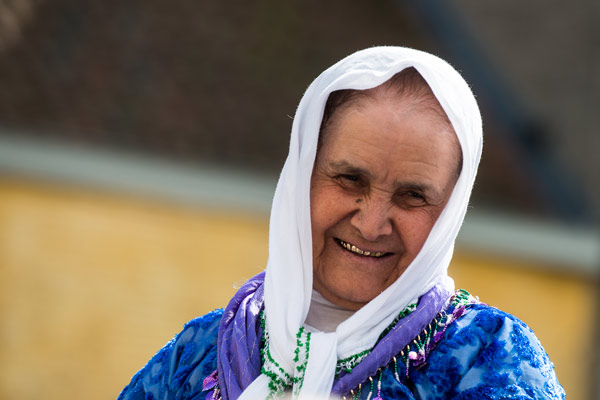
Vlaams Ouderenraad Fotobank
At international level, various instruments take into consideration the rights of older persons as previously seen. These instruments and processes aim at providing useful guidance for policy and practice in long-term care.
While most of these are not binding for national governments, they allow national governments and the EU a wide margin of appreciation as to how far they will apply the principles to which they have committed. Few effective monitoring mechanisms are also in place to assess progress at all levels.
Lacking adequate tools and comprehensive national policy frameworks which help them deal with the numerous policy objectives and international standards, it can be very difficult for practitioners to implement a rights-based approach in their work.
As far as the binding legal instruments are concerned, such as the UN Convention on the Rights of Persons with Disabilities and the European Convention of Human Rights, so far these have only paid marginal attention to the specific challenges faced by older persons in need of care.
This is why various organisations, including AGE Platform Europe, are arguing in favour of a new comprehensive legally binding UN treaty that would harmonise the application of these shared principles and provide for a monitoring framework enhancing governments accountability for the provision of quality rights-based long-term care.



